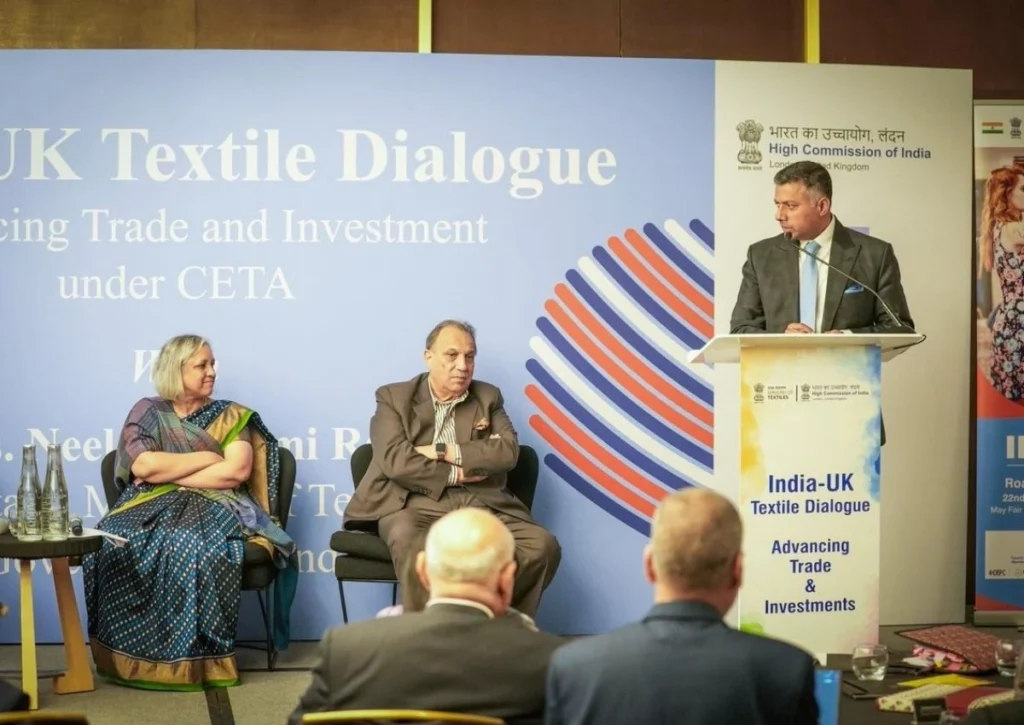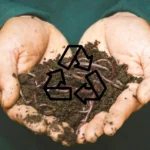Textile industry faced with a paradigm shift to a sustainable and innovative industry is taking a shift across the globe and India is leading the shift. A recent high profile delegation organized to the United Kingdom, Manchester, has shed some light on the emerging power of the Indian textile industry, and how they can redefine the international trade relationships.
Manchester Roadshow: A Strategy Showcase of Indian Excellence
During a great diplomatic and trade initiative a high-profile Indian group under the leadership of Ms. Neelam Shami Rao, Secretary of the Ministry of Textiles, Government of India, recently ended a successful Technical Textiles Roadshow in Manchester.
This strategic visit witnessed a group of senior government officials, industry representatives of man-made fiber industries, and important stakeholders of organizations such as TEXPROCIL to prove the new face of the country in the field of technical textile.
The decision to use Manchester as the location is specifically important. Being the cradle of the Industrial Revolution and having a long tradition of being a textile manufacturing power-house, Manchester was the best place to demonstrate how India is writing the next chapter of textile innovation in the world.

Understanding India’s Technical Textiles Revolution
Technical textiles are a niche of the textile industry that is not concerned with the look of the item but with the functionality. These high-technology materials are used in a wide variety of industries such as the health sector, automobiles, constructions, agriculture, and aviation.
Technical textiles are not pursued to serve the aesthetic purpose that traditional textiles serve, i.e. fashion or home furnishing, but rather to achieve certain performance criteria: i.e. strength, durability, flame resistance, or moisture management.
The Rising Market presence of India
The technical textiles industry in India has become one of the fastest developing industries in the Indian textile ecosystem. The growth of the industry is occasioned by a number of important factors:
Innovation and Research and Development: Indian manufacturers are heavily investing in research and development to come up with innovative solutions in the textile sector that will match the international standards and also other upcoming demands in the market.
High-level manufacturing facilities: The adoption of new advanced manufacturing technologies has helped the Indian firms to manufacture high quality technical textiles at cheap rates.
Practices in Circular Economy: The environmental awareness is fueling the initiation of sustainable manufacturing operations and the principles of the circular economy across the supply chain.
Government Initiatives Fueling Growth
National Technical Textiles Mission (NTTM)
The Government of India has shown a desire to be part of the sector by establishing a broad-scale initiative called the National Technical Textiles Mission which was aimed at making the industry competitive in the long term.
The NTTM focuses on:
Green Manufacturing: Tradition of environmental friendly manufacturing.
Reduction of Waste: The introduction of the principles of the circular economy to reduce waste.
Sustainability: Making both environmental and economic performance sustainable.
Innovation Support: This is the provision of research and development efforts.
PM MITRA and Production Linked Incentive (PLI) Scheme
There are two flagship government agendas that are developing business and world-class infrastructure environments:
PM MITRA Mega Textile Parks: These are integrated textile production sites that offer state of the art facilities, development of professional workforce and easy process of regulation.
Production Linked Incentive (PLI) Scheme: The program provides financial rewards to the companies meeting certain production levels to stimulate the increase of scale and efficiency.
India-UK Trade Relations: The CETA Advantage
Comprehensive Economic and Trade Agreement (CETA)
Ms. Neelam Shami Rao in her speech in Manchester has pointed out that the India-UK Comprehensive Economic and Trade Agreement is transformational.
CETA builds a win-win framework at benefit of the countries:
Benefits for the UK:
- Secure and sustainable sourcing prospective.
- Accessibility to cost-effective manufacturing.
- Potential technology relationships.
- Reliable supply chain solutions.
Benefits for India:
- Greater penetration of the consumers in the UK.
- Reduced tariff barriers
- Shared vision of quality
- Increase in investor confidence
- Potentialities of technology transfer
- Present Trade performance and market dynamics
Export Statistics FY 2024-25
The exports of India indicate that the sector is gaining relevance in the globe:
Total Exports to the world: USD 2.92 billion.
Major Export Categories:
- Packtech (packaging textiles): market share is 37.5%.
- Indutech (industrial textiles): market share of 28%.
Export to UK: USD 136 million, which is 4.7 percent of total exports.
Although the UK is at the moment a small share of India technical textiles exports, the growth prospects are high, especially with the strategic convergence of both countries, which is concerned with sustainability.
Opportunities and Growth Areas in the market
Technical textiles market has a variety of opportunities in various sectors:
Healthcare Textiles: Surgical equipment, protective products and medical devices.
Automotive Textiles: Interiors (car), safety and filtration systems.
Construction Textiles: Geotextiles, architectural membranes and insulation materials.
Agricultural Textiles: Crop protection, soil stabilization, and irrigation systems
Strategic Partnerships and Innovation Hubs
The visit of the delegation to Manchester Fashion Institute in Manchester Metropolitan University is one of the strategic partnership approaches.
This partnership dwells on:
Materials research Development of advanced materials is essential to maintain the U.S. economy and transform it into a powerhouse.
- Technical textiles sustainability development.
- Circular fashion model application.
- Knowledge transfer between academia and industry.
- Graphene Engineering Innovation Centre.
The tour of the Graphene Engineering Innovation Centre in Manchester shows that India is interested in next generation materials. Graphene, one of the marvelous materials, promises extraordinary options to technical fabrics, such as improved working power, conductivity, and pliability.
Building Resilient Supply Chains
Post-Pandemic Lessons
The COVID-19 pandemic highlighted the importance of resilient and diversified supply chains.
India’s textile sector offers:
- Geographic diversification away from over-concentrated manufacturing regions
- Cost-competitive production capabilities
- Proven manufacturing expertise
- Strong regulatory and quality frameworks
Strategic Advantages
Indian manufacturers provide several strategic advantages to international partners:
Cost Competitiveness: Lower production costs without compromising quality.
Scalability: Ability to handle large-volume orders.
Flexibility: Adaptability to changing market requirements.
Innovation: Continuous development of new products and solutions.
Also check:- PPA & GITF Announce Chief Guests for World Tourism Day 2025 Celebration
Final Thought
The Manchester roadshow is not just about the promotion of the trade however, it represents the transformation of the international textile trade to a sustainable, innovative, and win-win approach. As India is further cementing its niche in the technical textiles, alliances such as the one that is being developed with the UK shows how nations can join forces to solve the problems globally and in the process provide economic prospects.
Government assistance in the form of programs like NTTM and PLI, innovation by the corporate sector and strategic international relations have placed India to be able to meet its high export targets and also as part of the global sustainability. India has strong opportunities that can offer resilience in supply chain to businesses in the UK that are willing to invest in innovative and cost-effective textile solutions.
Since the world is shifting towards a more responsible and technologically efficient solution of textiles, the India-UK cooperation that has been established with the help of such activities as the Manchester roadshow is bound to be the example of cooperation between the countries in the new age of responsible manufacturing and trade.




